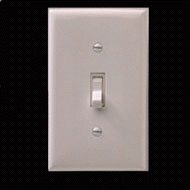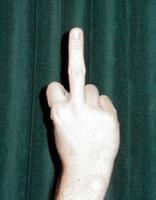Defining the machine
Do not rage against the machine, quietly flip it off. So what is "the machine?"
Here's from http://dict.die.net/machine/
machine
n 1: any mechanical or electrical device that transmits or
modifies energy to perform or assist in the performance
of human tasks
2: an intricate organization that accomplishes its goals
efficiently; "the war machine"
. . .
5: a group that controls the activities of a political party;
"he was endorsed by the Democratic machine" [syn: political
machine]
It is versions of the second definition of machine that I wish to flip off. If I can't put a stop to it, then I wish to register my displeasure:


Or
One or the other. Quietly means non violently. If the A** H*!#$s of the world won't give up being A** H*!#$s, then killing people is not going to make it better.
The machine is the greed machine that for the sake of profit dehumanizes workers. The machine is the war machine that topples democratically elected governments to replace them with greed machine friendly despots (Here's my favorite example). The machine locks the doors at the chicken factory to keep the workers from stealing and when the building catches fire, they die. (this incident is near the bottom of the linked page)
The machine is the mindset of the people who will do these things. That is what I wish to change, the mindset. I do not want to rage against the machine, for anger can become poison. But I do wish to be assertive, to have the courage to stand up, speak out, and raise my finger high at those who refuse to give up their anti-human beliefs and behaviors.
But I wish to acknowledge that nonviolence only works in specific situations. Here's a quote from George Orwell's essay on Ghandi:
Pictures used obtained from:
http://www.edserv.sjcoe.net/pdc/images/light-switch.gif
http://theruse.net/wp-gal/lostfiles/middle_finger.jpg
Here's from http://dict.die.net/machine/
machine
n 1: any mechanical or electrical device that transmits or
modifies energy to perform or assist in the performance
of human tasks
2: an intricate organization that accomplishes its goals
efficiently; "the war machine"
. . .
5: a group that controls the activities of a political party;
"he was endorsed by the Democratic machine" [syn: political
machine]
It is versions of the second definition of machine that I wish to flip off. If I can't put a stop to it, then I wish to register my displeasure:


Or
One or the other. Quietly means non violently. If the A** H*!#$s of the world won't give up being A** H*!#$s, then killing people is not going to make it better.
The machine is the greed machine that for the sake of profit dehumanizes workers. The machine is the war machine that topples democratically elected governments to replace them with greed machine friendly despots (Here's my favorite example). The machine locks the doors at the chicken factory to keep the workers from stealing and when the building catches fire, they die. (this incident is near the bottom of the linked page)
The machine is the mindset of the people who will do these things. That is what I wish to change, the mindset. I do not want to rage against the machine, for anger can become poison. But I do wish to be assertive, to have the courage to stand up, speak out, and raise my finger high at those who refuse to give up their anti-human beliefs and behaviors.
But I wish to acknowledge that nonviolence only works in specific situations. Here's a quote from George Orwell's essay on Ghandi:
I am a white male citizen of the United States, born in the 20th century, and as such I veiw the world from a vantage of privilege. It's easy for me to make this claim: I'm willing to die for my beliefs, but not to kill for them. Had I been born in Guatemala in 1935, or Palestine at anytime, or Rwanda, my outlook on life would be dramatically different. If I were to move to Darfur now, how long would I retain beliefs in nonviolence? But it is from this vantage point of privilege that I write. And this is where I shall end this segment."...[Ghandi] believed in "arousing the world", which is only possible if the world gets a chance to hear what you are doing. It is difficult to see how Gandhi's methods could be applied in a country where opponents of the régime disappear in the middle of the night and are never heard of again."
Pictures used obtained from:
http://www.edserv.sjcoe.net/pdc/images/light-switch.gif
http://theruse.net/wp-gal/lostfiles/middle_finger.jpg


0 Comments:
Post a Comment
<< Home